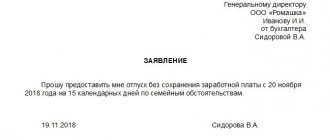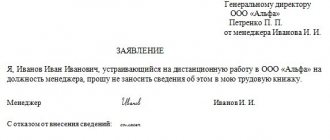It is not permissible to put a cliché instead of a signature on all papers, so in some cases the use of a facsimile does not make work easier, but leads to negative consequences. Let's try to figure out which documents are allowed to be signed with a facsimile signature, and when this should not be done.
The article was published in the magazine “Accounting News” No. 32 for August 2012
It is rare that an organization does not use facsimiles. On the one hand, this makes work easier and faster - the manager can quickly cope with the mountain of accumulated papers or even free himself from the tedious task of making resolutions by handing a facsimile to his deputy. On the other hand, it is not permissible to put a cliché instead of a signature on all papers, and therefore, in some cases, using a facsimile does not make work easier, but leads to negative consequences. Let's try to figure out which documents are allowed to be signed with a facsimile signature, and when this should not be done, and what the Ministry of Finance and arbitration courts think about this.
A mention of facsimile can be found in paragraph 2 of Art. 160 of the Civil Code of the Russian Federation, which states that the use of facsimile reproduction of a signature using mechanical or other copying means when making transactions is permitted in cases and in the manner provided for by law, other legal acts or agreement of the parties. That is, the use of facsimile reproduction of a personal signature is permitted if there is an appropriate agreement between the counterparties - a written agreement.
Can facsimiles be used on invoices?
The ancestor of the modern facsimile can be considered an ancient sign (often with an image of an animal) that our ancestors placed on property or livestock to indicate their ownership.
This helped in resolving disputes and disagreements regarding the determination of the owner of any material value. Director of Household Appliances LLC Konstantinov R.P., due to his job responsibilities, is forced to sign hundreds of documents every day (contracts, agreements, invoices, invoices, acts, etc.). To reduce his labor costs for signing a mountain of documents, he ordered himself a facsimile and began to use it. In addition, when leaving on a business trip, he left it in the accounting department so that the papers would not accumulate in his absence, but would be signed in a timely manner.
Legality of use
The concept of facsimile is not defined at the legislative level. Although the Civil Code of the Russian Federation indicates where and how a copy of the signature can be reproduced. It is legal to use it in civil transactions, because this is reflected by law.
A facsimile signature will be quite significant when going to court if both parties, when drawing up an agreement, additionally reflect their consent to use it or sign an agreement to accept this type of signature.
This is important for closely cooperating companies so that documentation signed with a handwritten copy acquires legal significance and becomes significant evidence in disputes .
Facsimile on invoices 2019
The Supreme Court ruling dated August 3, 2015 No. 303-KG15-8444 clearly states that the use of facsimiles on invoices contradicts the requirements set out in Art. 169 of the Tax Code of the Russian Federation states that the invoice must be signed by an authorized person in person.
A facsimile is an exact reproduction of a document or signature by means of photography or printing, conveying all the details of the original. In other words, it is a type of printing. In the context of everyday document flow, the use of a signature imprint (facsimile) of a manager or chief accountant seems very convenient, but is fraught with consequences (
Application procedure
To reduce the risk of liability for a manager at an enterprise, it is important to reflect in the agreement how the facsimile will be stored and used . An agreement for a company is a document confirming the legality of using a signature. The head of the enterprise must issue an order reflecting:
- rules, regulations for the implementation of copies;
- list of officials with the right to facsimile;
- list of documentation suitable for production;
- storage methods;
- access options and storage responsibilities.
Reference! An imprint of the signature replaces the handwritten version. This means it makes it possible to identify the manager. Entrepreneurs can grant such powers to employees by issuing a power of attorney for them, but who are responsible for storing and using facsimiles. The signature is not available to other employees. Otherwise, the rules for preparing primary documentation will be violated. The document flow of the enterprise as a whole may suffer.
Invoice 2021:
- From October 1, 2021, a strict requirement for the addresses of the seller and buyer is in force: now they must be indicated in accordance with the Unified State Register of Legal Entities. This means that the addresses are given in full on the new invoice form. If previously it was possible to confine oneself to an abbreviated entry, now this threatens the deprivation of a tax deduction.
- From October 1, 2021, new storage rules apply. Now documents must be stored in chronological order, by date of issue or receipt, for the relevant period. The storage period has not changed - invoices are still required to be stored for at least four years.
The crux of the matter
Example. Based on the decision, the tax authority conducted an on-site tax audit of the taxpayer regarding the correctness of calculation and timely payment (withholding, transfer) of taxes and fees for the audited period.
Based on the results of the audit, an act was drawn up in which the tax authority reflected violations of tax legislation, including when checking the correctness of VAT calculations, violations were found that were expressed in the unreasonable application of tax deductions on invoices issued by the taxpayer’s counterparties, namely the execution of invoices issued with using a facsimile signature. The circumstances identified during the control activities do not confirm the reality of business transactions between taxpayers and these counterparties; the expenses are not economically justified and documented.
Based on the results of consideration of the materials of the on-site tax audit, the report, the taxpayer’s objections, materials of additional tax control measures, the tax authority made a decision to prosecute for committing a tax offense, on the basis of which the taxpayer was asked to pay tax, including VAT.
Comments and opinions
However, as already indicated, according to paragraph 6 of Art. 169 of the Tax Code of the Russian Federation, an invoice issued on paper must be certified by the signature of the head and chief accountant of the company or the signatures of other persons authorized to do so by an order (other administrative document) for the organization or a power of attorney on behalf of the organization.
If the document is drawn up on behalf of an individual entrepreneur, it can be signed either by the entrepreneur himself, or by any other person authorized to do so by the entrepreneur’s power of attorney.
However, the use of invoices signed with a facsimile signature is not provided for in the Tax Code of the Russian Federation. Therefore, invoices drawn up using a facsimile signature are recognized as being drawn up in violation of the established procedure and cannot be the basis for the deduction of VAT amounts presented to the buyer by the seller. The same position can be found in letters from the Ministry of Finance of Russia dated 08/27/15 No. 03-07-09/49478 and dated 06/01/10 No. 03-07-09/33.
About the possibility of negative consequences
Let’s assume that a purchase and sale agreement or another civil law agreement is signed with a facsimile signature, but the parties did not enter into an agreement on the use of a facsimile. The court may recognize the following agreement:
- not concluded (Resolutions of the Federal Antimonopoly Service of the North Caucasus dated 09.08.11 No. A32-13609/2010, Ural Districts dated 06.10.09 No. F09-7622/09-C5 and Far Eastern Districts dated 08.13.09 No. F03-3794/2009);
- invalid due to non-compliance with the form of the agreement (FAS of the West Siberian District dated January 27, 2010 No. A02-413/2009).
At the same time, courts often reject claims to recognize such an agreement as invalid or unconcluded if the person whose facsimile was used subsequently approved this transaction or confirmed that he himself put a facsimile signature on the agreement, since he could not sign it personally, for example, because for injuries to the right hand (decrees of the Volgo-Vyatka Federal Antimonopoly Service dated 08.18.11 No. A43-18585/2010 and Ural District No. F09-10031/09-C5 dated 12.14.09). Direct subsequent approval of a transaction, in particular, can be understood as full or partial payment for goods, work or services, their acceptance for use, recognition of the counterparty’s claim, payment of a penalty, interest on the principal debt or other amounts, exercise of other rights and obligations under this transaction ( clause 5 of the information letter of the Presidium of the Supreme Arbitration Court of the Russian Federation dated October 23, 2000 No. 57).
Facsimile on invoice
The right to deduction will have to be challenged in court, based on the fact that the norms of the Tax Code of the Russian Federation do not determine the procedure for reproducing signatures of officials on an invoice. The invoice is signed by the head and chief accountant of the organization or other persons authorized to do so by an order (other administrative document) for the organization or a power of attorney on behalf of the organization (clause 6 of Article 169 of the Tax Code of the Russian Federation).
It is definitely necessary to deduct value added tax, especially if the goods are going to participate in activities subject to VAT, are accepted for accounting and the buyer has a supplier invoice (Clause 1 of Article 171 of the Tax Code of the Russian Federation). However, if the supplier's invoice on behalf of the director or chief accountant is signed using a facsimile, the taxpayer will definitely have problems, since the tax authorities, during the audit, will challenge the legality of the deduction. The Ministry of Finance of the Russian Federation has repeatedly given explanations to taxpayers about the impossibility of applying VAT deductions on facsimile invoices, referring to the fact that the norms of the Tax Code of the Russian Federation do not provide for the use of invoices signed with a facsimile signature.
Signing documents using facsimiles in civil law relations
The norms of civil legislation allow the use of facsimile reproduction of a signature when making transactions. To do this, the possibility and procedure for using such a signature must be provided for by agreement of the parties, law or other legal acts (clause 2 of Article 160 of the Civil Code of the Russian Federation). The legal status of a facsimile signature is not established by law. Consequently, the only basis for such signing of documents can only be a written agreement of the parties to the transaction. The agreement on the use of facsimiles is drawn up in any form, and if there are contractual relations between the parties, in the form of an appendix or addendum to the main agreement. It states:
- names of positions and full names of employees, whose signatures can be made using a facsimile;
- samples of facsimile prints of these signatures;
- a list of documents that can be certified using facsimiles;
- the procedure for the parties to act in the event of dismissal of these officials;
- the duration of the agreement (it can indicate that the agreement is valid until either party notifies the other party in writing of its intention to terminate this agreement).
Can facsimiles be used on invoices?
Facsimiles of invoices may deprive the buyer of a tax deduction. In our article we will tell you how to avoid this trouble, what to do to ensure that the facsimile does not complicate a businessman’s life, as well as other interesting details about the use of this sign.
Gradually, the seals acquired a more civilized appearance; instead of signs and pictures, personalized coats of arms began to appear on them, identifying the identity of the owner of the seal. They were used for certification of various documents. Seals of this type, to which we are all accustomed, first appeared in the Ancient East, where trade was well developed - they were used to seal trade agreements.
Results
- It is not recommended to use facsimiles on invoices, since in this case the right to a tax deduction will have to be proven in court, the outcome of which is difficult to predict.
- It is possible to relieve a merchant from signing invoices and at the same time do without facsimiles if you delegate this responsibility to authorized persons (based on an order or power of attorney).
- Another way to eliminate facsimiles on these documents is to use electronic forms. This will save time, get rid of claims from inspectors, save on printing paper copies, etc.
You can find more complete information on the topic in ConsultantPlus. Free trial access to the system for 2 days.
Facsimile on invoices 2021
Nowadays, conventional typographic fonts are giving way to their computer predecessors. A similar process can be observed in all sorts of industries, including the field of facsimile production on invoice. That is why, to order facsimiles on invoices, you need to get acquainted in particular with typefaces, as well as with the typefaces used in digital technology.
Almost all stamps have inscriptions. At least, every facsimile on invoices is not produced without inscriptions. After all, the inscription should provide information about the name of the company, as well as its details. Then the question arises, what font is used to make these inscriptions? And when it comes to the urgent and immediate production of such stamps, this question can drive almost any person into a dead end, because very few people think about such things.
Is a stamp placed on the invoice?
However, we must not forget: the seller’s stamp must be in the delivery note or in the act. If there is no stamp, the controllers will refuse the deduction - they will recognize the “primary” document as improperly executed. But note that the law “On Accounting” does not require stamping a document. That is, the tax authorities’ claims are illegal. However, this position is guaranteed to get you into the courtroom.
If a traveler's air ticket was purchased electronically, a security-stamped boarding pass is required, among other things, to verify travel expenses for "revenue" purposes. But what to do if it is not customary to put such marks at a foreign airport?






